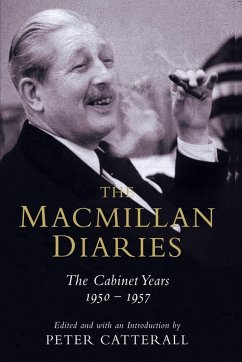- Broschiertes Buch
- Merkliste
- Auf die Merkliste
- Bewerten Bewerten
- Teilen
- Produkt teilen
- Produkterinnerung
- Produkterinnerung
First volume of Harold Macmillan's revealing diaries
Andere Kunden interessierten sich auch für
![Cab Confessions the Driver Diaries Cab Confessions the Driver Diaries]() Chris JayCab Confessions the Driver Diaries15,99 €
Chris JayCab Confessions the Driver Diaries15,99 €![The Ice Master The Ice Master]() Jennifer NivenThe Ice Master33,99 €
Jennifer NivenThe Ice Master33,99 €![The Sunday Telegraph A-Z Guide to Family Finance The Sunday Telegraph A-Z Guide to Family Finance]() Niki ChesworthThe Sunday Telegraph A-Z Guide to Family Finance30,99 €
Niki ChesworthThe Sunday Telegraph A-Z Guide to Family Finance30,99 €![Lord of the Dance Lord of the Dance]() Michael FlatleyLord of the Dance29,99 €
Michael FlatleyLord of the Dance29,99 €![The Borrible Trilogy The Borrible Trilogy]() Michael De LarrabeitiThe Borrible Trilogy41,99 €
Michael De LarrabeitiThe Borrible Trilogy41,99 €![My Quest for the Yeti My Quest for the Yeti]() Reinhold MessnerMy Quest for the Yeti21,99 €
Reinhold MessnerMy Quest for the Yeti21,99 €![Unholy War Unholy War]() David I. KertzerUnholy War29,99 €
David I. KertzerUnholy War29,99 €-
-
-
First volume of Harold Macmillan's revealing diaries
Hinweis: Dieser Artikel kann nur an eine deutsche Lieferadresse ausgeliefert werden.
Hinweis: Dieser Artikel kann nur an eine deutsche Lieferadresse ausgeliefert werden.
Produktdetails
- Produktdetails
- Verlag: Macmillan
- Seitenzahl: 730
- Erscheinungstermin: 5. Juli 2012
- Englisch
- Abmessung: 234mm x 156mm x 43mm
- Gewicht: 1222g
- ISBN-13: 9780230768437
- ISBN-10: 0230768431
- Artikelnr.: 57035859
- Herstellerkennzeichnung
- Libri GmbH
- Europaallee 1
- 36244 Bad Hersfeld
- gpsr@libri.de
- Verlag: Macmillan
- Seitenzahl: 730
- Erscheinungstermin: 5. Juli 2012
- Englisch
- Abmessung: 234mm x 156mm x 43mm
- Gewicht: 1222g
- ISBN-13: 9780230768437
- ISBN-10: 0230768431
- Artikelnr.: 57035859
- Herstellerkennzeichnung
- Libri GmbH
- Europaallee 1
- 36244 Bad Hersfeld
- gpsr@libri.de
Harold Macmillan, the grandson of Daniel Macmillan, the publisher, was born in 1894. Educated at Eton and Balliol College, Oxford. On the outbreak of the First World War, Macmillan left university and joined the Grenadier Guards. He served on the Western Front where he was wounded three times. After the Armistice, Macmillan joined the family publishing company but in the 1924 General Election he became the Conservative MP for Stockton-on-Tees. Defeated in the 1929 General Election he returned in to the House of Commons in 1931. Macmillan was a strong believer in social reform and his left-wing views were unpopular with the Conservative Party leadership. Macmillan was also highly critical of the foreign policies of Stanley Baldwin and Neville Chamberlain and remained a backbencher until in 1940 Winston Churchill invited him to join the government as parliamentary secretary to the ministry of supply. In 1942 Macmillan was sent to North Africa where he filled the new cabinet post as minister at Allied Headquarters. Harold Macmillan was defeated in the 1945 General Election but returned to the House of Commons later that year in a by-election at Bromley. After the 1951 General Election, Winston Churchill appointed Macmillan as his Minister of Housing. Macmillan was seen as one of the major successes in Churchill's government and received praise for achieving his promised target of 300,000 new houses a year. This was followed by a series of senior posts in the government: Minister of Defence (October, 1954 to April, 1955), Foreign Secretary (April, 1955 to December, 1955) and Chancellor of the Exchequer (December, 1955 to January 1957). When Anthony Eden resigned in 1957, Macmillan became Britain's new prime minister. He successfully won the 1959 General Election and at first the government enjoyed an economic boom and stable prices. In foreign affairs, Macmillan strengthen Anglo-American collaboration and made attempts to join the European Economic Community. Macmillan's tradition as a social reformer was reflected in his 'wind of change' speech at Cape Town in 1960 where he acknowledged the inevitability of African independence. The introduction of the system of life peerages to the House of Lords and the creation of the National Economic Development Council in 1961 were other examples of unlikely Conservative measures. In October, 1963, ill-health forced Macmillan to resign from office. After his retirement, Macmillan wrote Winds of Change (1966), The Blast of War (1967), Tides of Fortune (1969), Riding the Storm (1971) and At the End of the Day (1972). Granted the title Earl of Stockton, Harold Macmillan died in 1986.








